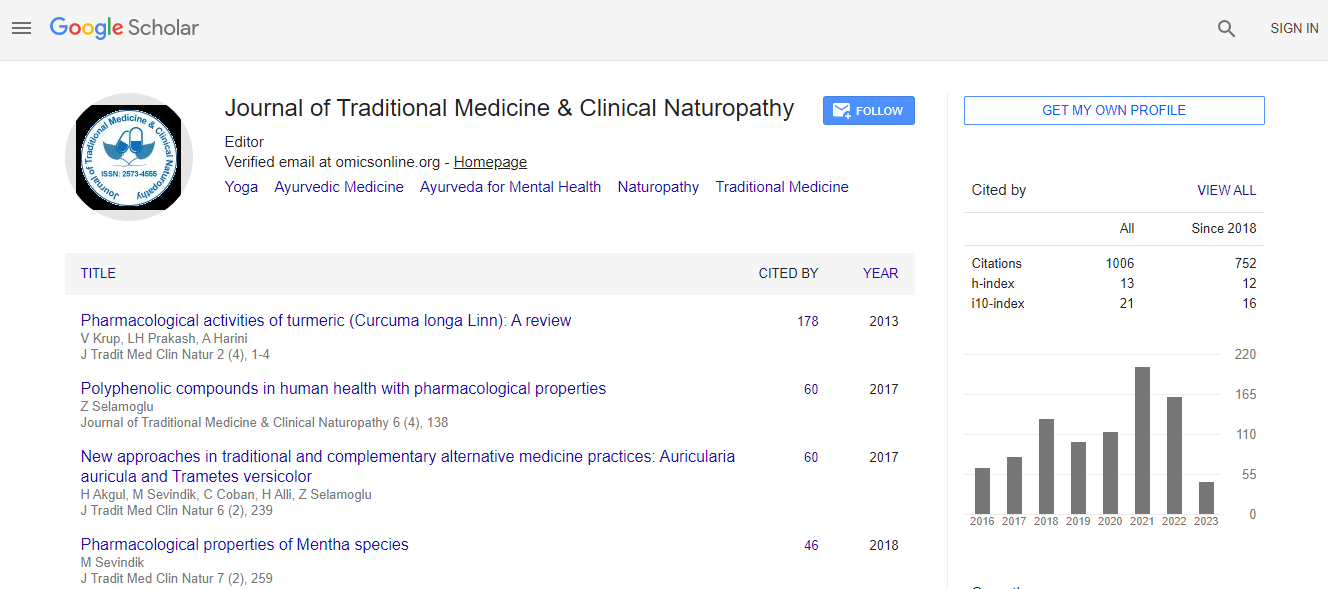Our Group organises 3000+ Global Conferenceseries Events every year across USA, Europe & Asia with support from 1000 more scientific Societies and Publishes 700+ Open Access Journals which contains over 50000 eminent personalities, reputed scientists as editorial board members.
Open Access Journals gaining more Readers and Citations
700 Journals and 15,000,000 Readers Each Journal is getting 25,000+ Readers
Google Scholar citation report
Citations : 1504
Journal of Traditional Medicine & Clinical Naturopathy peer review process verified at publons
Indexed In
- CAS Source Index (CASSI)
- Google Scholar
- Sherpa Romeo
- Open J Gate
- Genamics JournalSeek
- RefSeek
- Directory of Research Journal Indexing (DRJI)
- Hamdard University
- EBSCO A-Z
- Publons
- Geneva Foundation for Medical Education and Research
- Euro Pub
- ICMJE
Useful Links
Recommended Journals
Related Subjects
Share This Page
Phytochemical analysis, anti-bacterial assessment and evaluation of the effect of ethanolic extract of datura metel leaves on burns using albino rats model
World Congress on Traditional and Complementary Medicine
Folashade O Oyedeji and Olajumoke A Olaniyan
University of Ibadan, Nigeria
ScientificTracks Abstracts: J Tradit Med Clin Natur
Abstract
Burns is an injury which is painful and has a long traumatic healing process along with the psychological trauma associated with the scarification produced. In developing countries many of the injured persons may not have immediate access to orthodox medicine and therefore seek the help of traditional healers who use herbal treatments. It is imperative therefore to find herbs that are not only effective but can also reduce the pain associated with the healing process and encourage less scarification. Some indigenous herbal doctors in Nigeria treat wounds with juice squeezed out from Datura metel leaves. In this study, air dried, pulverized leaves of this plant was extracted with ethanol using the soxhlet extraction method and phytochemical analysis of the extract carried out. Different concentrations of the extract were evaluated for antibacterial activity against Staphylococcus aureus (ATCC 29213), Escherichia coli (ATCC 35218), Pseudomonas aeruginosa (ATCC 27353), Clinical isolates of Salmonella species, Klebsiella species and Bacillus subtillis using the pour plate method. Various concentrations (10 – 40%w/w) of the extract were formulated into ointments using petroleum jelly as ointment base.The extract was then investigated for burns healing efficiency using albino rats as model; by placing thity (30) female adult rats in six groups of five rats each divided into controls and treatment groups. Thermal wounds (Burns) were created on denuded skin patches on the rats. The burn sites of the treatment groups were then treated with 10% w/w, 20%w/w and 40%w/w ethanolic extract ointments of Datura metel for 16 days post – burns. Positive control groups were treated with Cicatrin powder (Neomycin and Bacitracin), Zero control group with petroleum Jelly while the Negative control group was treated with sterile distilled water. At the end of the treatment period, the rats were sacrificed and histopahological investigations carried out. Phytochemical analysis of the extract revealed the presence of tannins, alkaloids, terpenoids, triterpenoids, steroids, flavonoids, saponins and phenolic compounds. The crude extract exhibited antibacterial effect against all the pathogens studied. The formulated ointments produced significant effects in terms of wound contracing ability and wound closure within the 16 days treatment period. Histopathological examination of the wound site showed the 40%w/w extract to have exhibited the most significant healing result. Ethanolic extract of Datura metel was shown to have antibacterial and burns healing properties thus providing a scientific support for the traditional use of the leaves of this herbal plant in the management of wounds.Biography
Folashade O Oyedeji completed her PhD in 2003. She has served as teaching and research staff of the Department of Chemistry University of Ibadan since 1997. She has published more than 28 articles in reputable journal. She is a member of many learned Societies and has served on many boards in the University as well as in other Societies. She is an Industrial Chemist with Cosmetic chemistry as her special area of study. She is a cosmetic formulator with interest in the use of herbs as active ingredients and cosmeceuticals. Her research area is in the use of local plant materials and herbs for solving many skin based challenges.
E-mail: omoeage2002@yahoo.com

 Spanish
Spanish  Chinese
Chinese  Russian
Russian  German
German  French
French  Japanese
Japanese  Portuguese
Portuguese  Hindi
Hindi 
